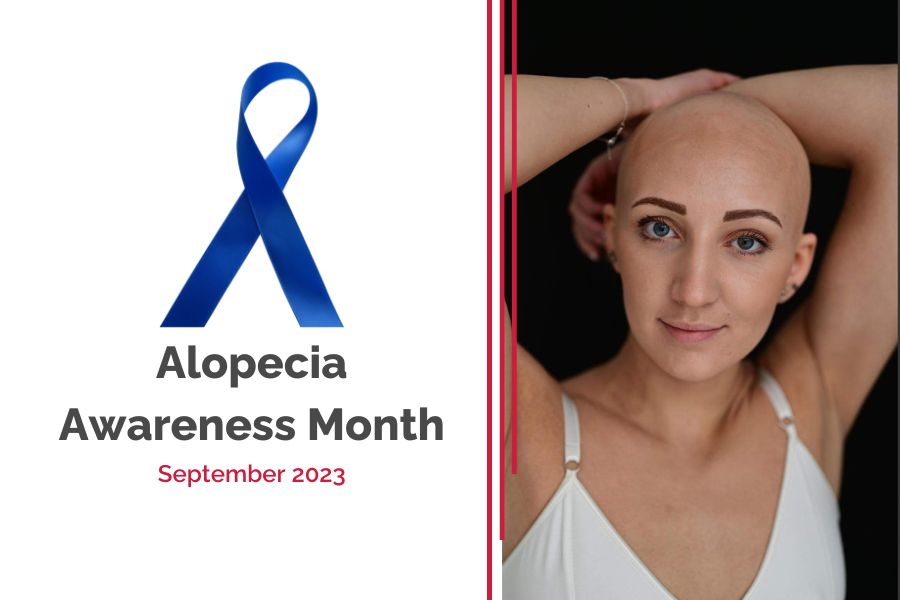Alopecia Awareness Month is more than just a designated time on the calendar; it’s an opportunity for us to shed light on a condition that affects millions of people around the world. In fact, in the UK alone, 100,000 people are currently affected by alopecia areata, making it important to raise awareness of such a common yet misunderstood condition.
In this blog, we will explore the significance of Alopecia Awareness Month, delving into stories of those experiencing alopecia who are looking to inspire others, our advice and guidance, plus a personal message from Stuart, founder of Joseph’s Wigs.
The meaning behind Alopecia Awareness Month
Started in 1986, a week originally recognising alopecia has grown into a national movement, supported by the National Alopecia Areata Foundation. Although Alopecia Awareness Month is marked on our calendars every September, we recognise the importance of raising awareness all year round and aim to educate those with and without alopecia, reduce the stigma and inspire others.
5 tips for staying positive when experiencing alopecia hair loss
Whether you are just starting on your journey with alopecia, or are navigating the condition, there are days when you just need a pick me up, and an opportunity to regain the confidence you may have lost on your journey. With the help of our customers, we have put together 5 top tips for staying positive when experiencing hair loss from alopecia.
Tip 1: Speak to others who ‘get it'
If you don’t know anyone with alopecia, it can feel quite isolating. Meeting people who are on a similar path can help. Fortunately, there are plenty of online and in-person support groups set up for people just like you, allowing you to open up, offer guidance and make new friends within the alopecia community. Find a local alopecia support group here.

Tip 2: Perspective
When you first lose your hair, it can take a toll on your self-confidence, and you may ask yourself ‘Why me?’. Joseph’s Wigs customer, Doreen, shared her experience with alopecia and explained that sometimes putting things into perspective can make your journey that little bit easier.
“One has to actually go through the despair of losing all their hair to understand the sadness and misery of it fully. But Alopecia isn’t life-threatening or painful even, so over time, I have picked myself up and told myself to get on with it. I put things into perspective and remind myself to be grateful that my hair loss is due to stress and not cancer or illness.”
Doreen can inspire us all, read her full wig wearing story and learn how her journey has shaped the person she is today.

Tip 3: Advances in Wig Technology
One reason to keep a positive attitude in the face of alopecia is that modern wig technology has allowed for the development of millions of stunning, comfortable, and highly natural wigs.
Wigs are available in a plethora of styles, shades, budgets and materials, meaning there is a look for every preference. So, whether you prefer a synthetic wig for occasion wear, or a real human hair wig for maximum versatility day to day, you can find the right headpiece for your needs. What’s more, wearing a wig is a great way to boost your confidence as it can hide the fact you are experiencing hair loss, whilst your hair grows underneath. Many companies produce lightweight and breathable wigs designed specifically for people with alopecia, so you won’t have to worry about wearing a wig stunting your hair growth or prolonging your alopecia symptoms.
Joseph’s Wigs customer, Tammy, told us of her wig-wearing journey:
“The word ‘wig’ always put me off, and truthfully, I was very against wearing them as early wig styles weren’t great, But as time went on, I grew to learn what was important to me in a wig, such as a monofilament top, a lace front and silicone tabs for comfort. Now I can safely say that I am comfortable within myself, although I am still not a fan of the word ‘wig’!”
Whilst Doreen said: “My wigs, of which there have been many, have given me the confidence I needed to get on with my life, whilst encouraging others with hair loss to do the same.”
If you’re new to the world of wigs and not sure where to start, you’re not alone. Take a look at Kristina’s story and learn how she navigated the world of wigs as a first-time wig wearer.

Tip 4: Remember you are still YOU
Losing your hair doesn’t imply that you are losing yourself. Whilst it’s an unwanted and often scary change, for others, this is just part of your appearance, a unique feature that makes you ‘you’ and nothing more. Never forget that alopecia doesn’t stop you from enjoying your hobbies, being around your loved ones and living your life to the fullest. With or without hair, you are still you.
Tip 5: It’s likely your hair will return
Whilst there is no simple cure for alopecia, the good news is that in most people, new hair eventually grows back in the affected areas, with 50% of people with mild alopecia areata recovering within a year. So, whilst it can seem hard at this moment in time, adopting the mantra ‘this too shall pass’ may help you to keep positive in the more difficult moments.
Emily Smith (AKA Alopecia Diaries), recently shared 6 common alopecia myths and discussed that many people believe alopecia causes every single one of your hairs to fall out. Fortunately, this is just a myth and Emily said “I’ve had my eyebrows fall out and my eyelashes, but now my lashes have come back, I’ve got half an eyebrow on my right and I’ve got patchiness coming back on my head.” This highlights that everyone’s journey with alopecia is unique, but you can have peace of mind that you’re unlikely to lose all of your hair.
Take a look at more alopecia myths debunked.
How you can get involved
Everyone can get involved. Here are some of the ways you can make a difference:
Make a donation
Several alopecia charities depend on donations, large or small, from individuals and companies. These donations help educate, raise awareness, and help charities reach more people who may otherwise feel alone or unsupported, while also driving the development of new treatments.
- Donate to the National Alopecia Areata Foundation (NAAF)
- Donate to Alopecia UK
- Donate to Children’s Alopecia Project (CAP)
Share your alopecia journey
Whether it’s your journey with wigs for alopecia, your diagnosis or recovery, sharing your story can empower others and help to tackle the stigma surrounding this condition. Tell your friends, post on social media using the hashtag #alopeciaawarenessmonth or get in touch with our team so we can share your story with our community.
Join the community and read our customer stories.
Learn about it
Even if you’re not experiencing it yourself, Alopecia Awareness Month is an opportunity for you to learn more about hair falling out from alopecia. There are ample resources available to ensure you have all the information you need to support others, raise awareness, and learn the basics of what it is and how it affects those living with this condition. Here are some resources to get you started:
- Helping children with hair loss
- The causes of alopecia
- What alopecia does to your health
- Why you should donate hair and what you need to know
How Joseph’s Wigs can help
No matter where you are on your journey, you’re not alone. With 50+ years of experience in supporting our hair loss clients, we are equipped with the knowledge and products you need to help you find your way.
A message from Stuart:
"A lot of new customers when they first come to visit us think they’re the only one that has ever experienced alopecia, and they feel really isolated. This is where alopecia awareness month really helps by highlighting that there is support out there and they’re not on their own!"
Our extensive collection features more than 1,500 ladies wigs, male toupees and hair pieces from industry-leading designers. We offer compassionate wig fitting services to help all wig wearers find their perfect wig to help regain their confidence whilst experiencing hair loss. Browse our range of wigs for alopecia online.
Alternatively, get in touch for more advice and allow us to guide you through your journey with alopecia.











